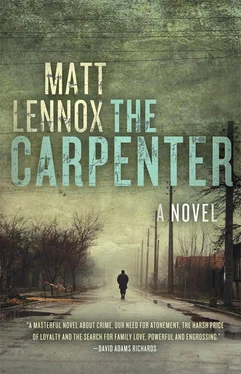Matt Lennox - The Carpenter
Здесь есть возможность читать онлайн «Matt Lennox - The Carpenter» весь текст электронной книги совершенно бесплатно (целиком полную версию без сокращений). В некоторых случаях можно слушать аудио, скачать через торрент в формате fb2 и присутствует краткое содержание. Жанр: Криминальный детектив, на английском языке. Описание произведения, (предисловие) а так же отзывы посетителей доступны на портале библиотеки ЛибКат.
- Название:The Carpenter
- Автор:
- Жанр:
- Год:неизвестен
- ISBN:нет данных
- Рейтинг книги:5 / 5. Голосов: 1
-
Избранное:Добавить в избранное
- Отзывы:
-
Ваша оценка:
- 100
- 1
- 2
- 3
- 4
- 5
The Carpenter: краткое содержание, описание и аннотация
Предлагаем к чтению аннотацию, описание, краткое содержание или предисловие (зависит от того, что написал сам автор книги «The Carpenter»). Если вы не нашли необходимую информацию о книге — напишите в комментариях, мы постараемся отыскать её.
The Carpenter — читать онлайн бесплатно полную книгу (весь текст) целиком
Ниже представлен текст книги, разбитый по страницам. Система сохранения места последней прочитанной страницы, позволяет с удобством читать онлайн бесплатно книгу «The Carpenter», без необходимости каждый раз заново искать на чём Вы остановились. Поставьте закладку, и сможете в любой момент перейти на страницу, на которой закончили чтение.
Интервал:
Закладка:
By the time the lesson was done, Irene’s eyes were closed. Lee went over and took her hand. Barry smiled at him and said: Come on, Brother Lee. I have to swing by the church. I’ll drop you off at your new place.
Sometime after midnight, Lee woke from the same dream he’d been having for as long as he could remember. In the dream he was a boy again, venturing down into the basement of the boarding house in town where he and Donna grew up. The basement had brick walls and a dirt floor and towards the back was a coal furnace. A set of octopus pipes stretched up from the firebox and transmitted strange sounds through the house at night.
In Lee’s dream, none of the dimensions were quite right and it seemed as if he approached the furnace slowly, over a great distance. He’d hear a sound and turn to see a crippled caretaker, bearing a spadeshovel full of coal, taking shape out of the dark. The caretaker always looked like he was about to say something but he never did. Lee would try to run, but would find his feet fixed to the floor, and with the certainty of dreams he knew the spadeshovel was meant for him, to lift him whole or in pieces and carry him over to the furnace and load him onto the burning coals.
The dream had come frequently to Lee through much of his childhood, through his years in prison. It troubled him. It always had.
A little later, he gave up on the idea of sleep. He got up from the pullout couch and walked around the apartment. Eventually he put on his jeans and undershirt, and he went outside and stood on the sidewalk. The street was deserted. A stoplight blinked overhead. Nothing was quite believable yet.
Judy Lacroix was dead inside a car, parked on the gravel patch where the drive-in cinema had burned down. When Stan Maitland found her, he had a feeling of all his long years as a cop dilating on him. He knew who Judy was. He knew her family. This was a particular burden he held entirely to himself. That it was he who should find the girl dead in the car was proof of what could not be outstripped by the passing of time alone.
Earlier that evening, Stan had been fishing with his granddaughter Louise. They’d taken Stan’s boat north across Lake Kissinaw to a shoal in one of the back bays. Stan had brought along a carton of earthworms. Louise sat on the skiff’s middle seat. Her rubber boots did not touch the floor.
They conferred between long stretches of affable quiet. He loved how she would ply him with questions as to the nature of things.
— Grandpa, what do the fish do when the ice comes?
— Different fish do different things under the ice. I don’t know all of them, but bass-I told you how to tell which ones are bass-slow down and don’t do much. They just kind of hang around till it gets warm again. Sometimes my friends and I used to ice-fish, and on a nicer day we might think we could catch bass, but we never could.
Over an hour and a half they caught two pickerel and a small-mouth bass. When it was time to go he pulled the stringer of catch up into the skiff. In his tackle box he had a hatchet-handle, which he used to crack each fish across the skull. Louise sat primly, studying his every motion. Stan laid the dead fish on the bottom of the boat and rinsed his hands in the lake water. He stood, feeling his back pop, and heaved the pull-cord on the motor.
It was two days past the new moon, and by the time they returned to Echo Point the dark had fully settled. He’d left a light on in the front window of the house.
A dark form appeared on the dock while Stan was tying up. It was Cassius coming to greet them. Stan pushed the old black dog’s muzzle away from the fish. Louise trailed her hand along Cassius’s back.
— Can I see you clean the fish?
— I have to take you home now. It’s getting on to bedtime.
— Grandpa …
He knelt down beside her.
— You’ll get Grandpa in trouble, said Stan. Come on, let’s get your things. You can ride in the middle seat.
Stan told Cassius to stay in the yard. Louise climbed up into the cab of Stan’s pickup and Stan got into the driver’s seat and drove them out along Echo Point Road.
They talked about Louise’s first day of grade three. She wanted to know if he remembered when he’d been in grade three. He told her it had been in a one-room schoolhouse. He’d had to light the woodstove in winter. The building was gone now, long gone. It had been on the edge of the piece of land where the town had put up a golf course fifteen years ago.
Stan drove them out of the bush and they passed through open country. Ahead of them dust rose in the headlights. Then they were coming up to the drive-in. A screen stood out against the horizon. The box office and the concession stand and one of the other screens had burned down the year before. Some people around town whispered about a collection on insurance. Stan had been able to see the glow of the fire from the second floor of his house. He’d gone in his truck. The town fire department and the volunteer firefighters had already had the burning screen and the concession stand cordoned off when he arrived, but he’d come ahead of the police. The cops, when they finally showed up, were young. He hadn’t recognized them and they didn’t know who he was.
Now, passing the drive-in with Louise beside him, Stan saw how the thin new moon shone on the windshield of a car. The car was parked halfway to where the burned movie screen stood in deeper black against the stars. The car was dark. He thought about it and did not think about it.
Then the drive-in disappeared behind them.
Before long he merged onto the highway. The lights of town lay ahead. Louise put her head on Stan’s arm.
Mary and Frank Casey had a modern split-level house east of downtown. The windows were lit. Parked in the driveway were Mary’s Volvo and a provincial patrol car. Mary opened the front door as Stan came up the walk, carrying Louise, who had fallen asleep.
He took her upstairs and put her into her bed, and then he stood back and spent a moment looking at her. He wondered, vaguely, how many more years he would get to see her grow up.
He followed Mary back down to the living room.
— I hope I didn’t get her home too late.
— No, Dad, it’s fine. Thanks. She loves it.
Mary sat in the loveseat and Stan sat down on the couch. Next to it, against the wall, was a Clarendon upright piano. Stan put his hand out and dallied his fingers over the keys but did not press them. Frank came out of the kitchen. He was wearing a grey T-shirt and his uniform trousers.
— Thanks for taking Louise, Stan.
— It’s never any trouble. Where’s Emily?
Frank sat on the arm of the loveseat and said: She’s seventeen. You can guess where she’s at.
— A new boyfriend?
— A boy. I don’t know that I’d call him more than that. With her, it’s the stray cats.
— She has good sense, Frank, said Mary, putting her hand on his knee.
— How’s the detachment? said Stan.
— Labour Day is over. All the kids are back in school, let’s put it that way. That makes me happy.
— Fall was always a quiet time, said Stan. A lot of people were too busy on the farms to mess around.
— Well, if things didn’t change like they do, I wouldn’t need half the cops I have now, fall or not. But that’s how it goes.
— That’s how it goes, said Stan.
Stan was back on the road a short while later. He was only eight years retired from the local detachment, despite what it had meant for his pension. At one time he’d known every street in town. He turned off the highway and five minutes later he passed the drive-in again. His headlights caught the same car he’d seen earlier.
Stan drove by. Then he pulled off to the side of the road. Gravel snarled against the underside of his truck as he moved from the hardtop to the shoulder. He brought the vehicle to a stop and sat holding the steering wheel. Then he got out of the truck and took out a D-cell flashlight that he kept under the seat. He didn’t turn it on just yet. There was enough light from the stars and the moon to bring everything out in halftones. He walked into the drive-in lot.
Читать дальшеИнтервал:
Закладка:
Похожие книги на «The Carpenter»
Представляем Вашему вниманию похожие книги на «The Carpenter» списком для выбора. Мы отобрали схожую по названию и смыслу литературу в надежде предоставить читателям больше вариантов отыскать новые, интересные, ещё непрочитанные произведения.
Обсуждение, отзывы о книге «The Carpenter» и просто собственные мнения читателей. Оставьте ваши комментарии, напишите, что Вы думаете о произведении, его смысле или главных героях. Укажите что конкретно понравилось, а что нет, и почему Вы так считаете.












